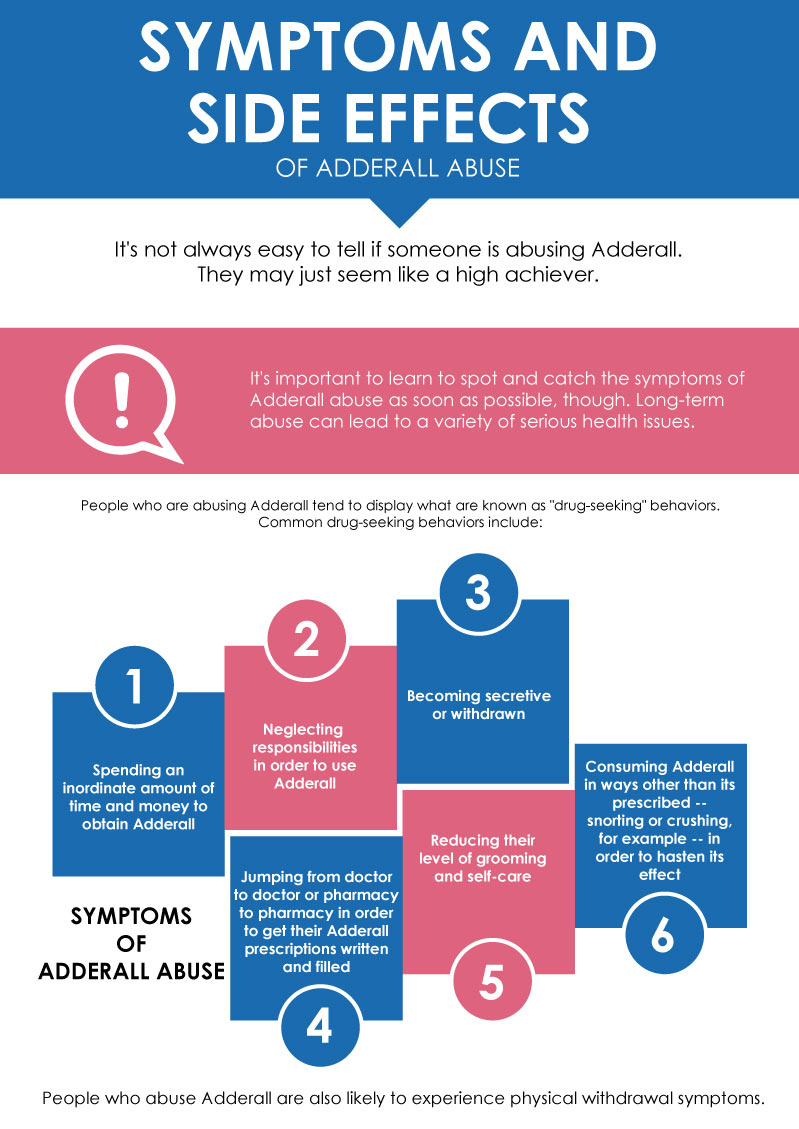Prescription drug abuse is a serious problem in the United States, and millions of Americans consistently use prescriptions for non-medical purposes.
Of all the prescription drugs that people regularly abuse, Adderall, also known as amphetamine/dextroamphetamine, is one of the most popular, especially among young adults.
Read on to learn more about Adderall abuse and what you can do to help a loved one seek treatment.
What is Adderall?
Adderall is a combination medication. It’s often used to treat attention deficit hyperactivity disorder (or ADHD). Some doctors also prescribe it to treat narcolepsy, a severe sleep disorder.
Adderall is a stimulant. It works by increasing the availability of two neurotransmitters: norepinephrine and dopamine.
By increasing the availability of these neurotransmitters, Adderall can temporarily speed up brain activity.
People who take Adderall tend to have an easier time staying alert and focused. They’re also more organized and have an easier time listening to instructions.
When Adderall is overconsumed, people tend to experience a euphoric feeling. When it wears off, they feel anxious, depressed, and/or irritable.
Over time, they will develop a tolerance to that particular dose and need more to experience the same feeling. This is how an addiction cycle begins.
Adderall Addiction Risk Factors
Many people use Adderall in a safe, responsible way to help them manage conditions like ADHD. However, some people are also more likely than others to end up abusing it.
Teenagers and young adults are most likely to abuse Adderall, especially if they fall into one of the following groups:
- Students
- People with eating disorders who are trying to lose weight
- People with high-stress jobs
- Athletes
- People with a history of drug abuse
People who use Adderall are also more likely to become addicted when they’re taking one of the following medications:
- Decongestants
- Painkillers
- Antidepressants
- Antiseizure medications
- Antacids
- Blood pressure medications
- Blood thinners
- Lithium
Adderall has the potential to interact negatively with these medications and heighten their effects. It’s important to avoid Adderall, or at least consult with your doctor before taking it, if you’re also using one of these other drugs.
Symptoms and Side Effects of Adderall Abuse
 It’s not always easy to tell if someone is abusing Adderall. They may just seem like a high achiever.
It’s not always easy to tell if someone is abusing Adderall. They may just seem like a high achiever.
It’s important to learn to spot and catch the symptoms of Adderall abuse as soon as possible, though. Long-term abuse can lead to a variety of serious health issues.
Symptoms of Adderall Abuse
People who are abusing Adderall tend to display what are known as “drug-seeking” behaviors. Common drug-seeking behaviors include:
- Spending an inordinate amount of time and money to obtain Adderall
- Neglecting responsibilities in order to use Adderall
- Becoming secretive or withdrawn
- Jumping from doctor to doctor or pharmacy to pharmacy in order to get their Adderall prescriptions written and filled
- Reducing their level of grooming and self-care
- Consuming Adderall in ways other than its prescribed — snorting or crushing, for example — in order to hasten its effects
People who abuse Adderall are also likely to experience physical withdrawal symptoms.
Adderall Withdrawal
The symptoms associated with Adderall withdrawal are similar to the withdrawal symptoms people experience when they stop using Ritalin, another popular drug used to treat ADHD. Common withdrawal symptoms include:
- Restlessness
- Weight loss
- Insomnia
- Dizziness
- Fatigue
- Rapid heart rate
- Panic attacks
- Seizures
- High blood pressure
- Blurred vision
- Dry mouth
- Depression
- Suicidal thoughts
- Paranoia
The longer you continue to abuse Adderall, the more intense these withdrawal symptoms will be when you go too long without consuming it.
Adderall Overdose
As with many other prescription drugs, it’s also possible to overdose on Adderall. If someone overdoses on Adderall, they may experience the following symptoms:
- Vomiting
- Nausea
- Fever
- Tremors
- Fainting
- Rapid heart rate
- Rapid respiratory rate
- Chest pain
In severe cases, people who overdose on Adderall are also at risk of experiencing seizures and heart attacks.
Seeking Treatment for Adderall Abuse
Unfortunately, there are no medications that have been approved to treat an Adderall addiction.
That doesn’t mean that treatment is impossible, though.
The most effective method for people who struggle with Adderall abuse or addiction is to go through a detoxification procedure under the supervision of a licensed medical professional. There are lots of detoxification facilities throughout the country that are geared toward helping people overcome addiction.
The withdrawal symptoms associated with the Adderall detoxification process are quite intense. It’s important to work with a doctor while going through this to stay safe and avoid severe illness.
Generally speaking, it’s not a good idea to give up Adderall cold turkey.
Instead of stopping your drug usage all at once, your doctor will help you taper off the drug. They do this by gradually reduce your dosage over a period of weeks or months.
Adderall Addiction Recovery Process
If you do decide to enroll in a detoxification or rehabilitation program, the process will likely include these steps:
- Enroll in the program
- Receive an assessment and medical evaluation
- Begin working with an assigned physician
- Slowly taper off Adderall under medical supervision
- Work with your doctor to manage withdrawal symptoms
- Work with a therapist to change the behaviors and thought patterns that lead to your addiction
Once you’ve completed these steps (which usually take several weeks or months), you’ll work with your physician and/or therapist to develop an aftercare plan.
This plan will likely include ongoing meetings with a support group or ongoing individual counseling with a licensed therapist.
The aftercare plan is especially important. It will help you maintain the coping skills you learned while going through the program and make it easier for you to stay drug-free once you leave.
Are You Struggling with Adderall Abuse?
Adderall abuse isn’t always easy to spot, but it’s a serious issue that must be addressed as soon as possible.
If you or a loved one is struggling with Adderall abuse, it’s important to know that help is out there.
If you live in or around the Los Angeles area, contact us at Revive Detox today.
We offer a variety of detox programs to help you get clean and take back control of your life. Remember, it’s never too late to seek treatment.Most PPO Health
